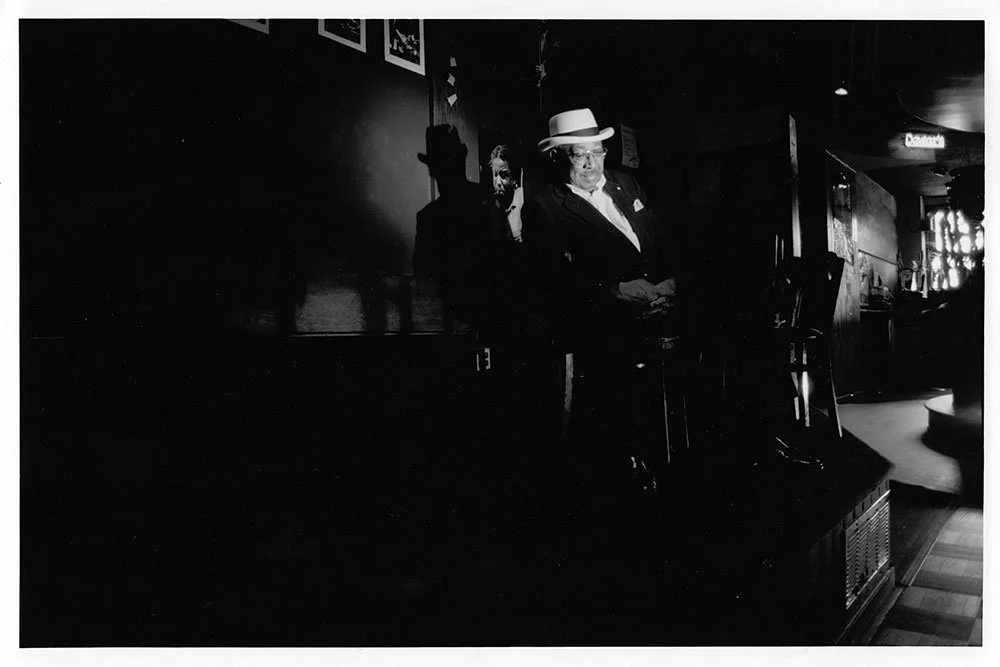Big Joe Burrell
Big Joe Burrell
An Essay by Reuben Jackson
Saxophonist, composer, bandleader, mentor and blithe spirit Big Joe Burrell was the living embodiment of composer-musician-producer Quincy Jones’s definition of jazz: Soul and science. But as musicians and music lovers (both in and outside The Green Mountain State) will still readily attest, Burrell, who died at the age of 80 in 2005, also exemplified Duke Ellington’s highest compliment for any musician: Beyond Category.
For while much of the material performed on stage and on record could fall neatly into neighborhoods like Blues or The American Popular Song, the truth of the matter is that Burrrell’s live and studio efforts both celebrated and lovingly defied any such narrowcasting.
As legendary Vermont–based guitarist Paul Asbell noted, “When I first met him, musically what was clear to me was that Joe had the older vocabulary of jazz players like Coleman Hawkins, as well as the blues vocabulary as played by jazz musicians. “As soon as he started singing, it was clear he was much more than a jazz player — he had the feel of a real BLUES singer. It’s like hearing someone who plays like Wes Montgomery and Jimi Hendrix at the same time.”
Burrell’s voice and saxophone turned blues, jazz and popular song evergreens into ultra-moving, nuanced and unforgettable tales on the ups and downs of romance — and life. You could dance to it — as countless fans, both in and outside the United States did with great fervor — but the sound and sincerity lingered long after the music stopped.
Big Joe Burrell’s passionate and lifelong affair with music began in his hometown of Port Huron, Michigan, where he was born on February 9, 1924. He had a particular fascination and love for the music of pianist and bandleader William “Count Basie” (another artist whose output wed innovation, soul and accessibility). One of seven children, Burrell began playing saxophone in his teens which led to countless gigs, both in the United States and Canada. Among his many memorable musical encounters was the period in which he performed and recorded with blues great B.B. King.
Burrell’s soon-to-be indelible mark on the Vermont music scene began after leaving Quebec (where he had been living) for a gig at The Roostertail. He’d originally planned to only stay in Vermont for two weeks, but, like countless others who fell head over heels with Vermont, Burrell tersely stated, “I didn’t want to go back to the city; I like to be where I know people.”
After settling in Burlington, Burrell was asked if he would sit in for a monthly blues night at Hunt’s, a storied Burlington nightspot. Like legions of leaf peepers in autumn, crowds began flocking to Hunt’s. And the band formerly known as Kilimanjaro became The Unknown Blues Band with Big Joe Burrell. Burrell’s musical experience — soulful sincerity and the band’s equally rousing consistency — led to growing popularity, both within Vermont and far beyond its borders, including a highly successful tour of the Soviet Union in 1991. Burrell also served as a sometimes gruff but nurturing mentor for the likes of saxophonist Dave Grippo, trumpeter Joey Sommerville, and guitarist Paul Asbell, among other notable Vermont musicians.
For those who were not fortunate enough to have seen or heard Big Joe Burrell, one need only seek out his sensual, melodic truth telling. It can be found on his readings of blues standards such as 1961’s “A Dream Last Night,” more recent efforts like "Teardrops Falling" from his 2003 CD, “I’m Just A Lucky So And So,” and the blues staple “Everyday”, from The Unknown Blues Band’s 1983 CD “Live At Hunts’”. Each of the aforementioned is drenched in Burrell’s commitment to exploring and sharing the joy and power of song.
— Reuben Jackson, 2021
Reuben Jackson records his essay for the mobile exhibit at the studio of Luke Awtry. Photo by Luke Awtry Photography.
Essex High School student Marcino Ambris views the mobile Big Joe Burrell saxophone exhibit. Photo by Lafoi Faith Awotho/Big Heavy World.
The Saxophones of Big Joe Burrell
Selmer Paris Mark VI Tenor Saxophone of Big Joe Burrell, Engraved
1974
Assembled in Elkhart, Indiana. One of the last production Mk VI tenors. Conservator: Jonathan Ranney, Ellis Music Co., Bethel, Vermont.
H.N. White King Zephyr Series 1 Saxophone of Big Joe Burrell, Engraved
1942
Assembled in Cleveland, Ohio. One of less than 10,000 built in a low production war year. Conservator: Jonathan Ranney, Ellis Music Co., Bethel, Vermont.
Acquisition of Big Joe Burrell’s instruments was made possible by generous gifts from Dr. Leon Burrell, Todd R. Lockwood, and the City of Burlington Racial Equity, Inclusion & Belonging Office. Our curators owe special thanks to the Fleming Museum for their support in creation of these exhibits. Supported in part by the Vermont Humanities.
Big Joe Burrell on the Nectar’s stage in Burlington, Vermont. Photo by Matthew Thorsen.
A Brief Biography of Big Joe Burrell
Adapted from Big Joe Burrell’s obituary published February 6, 2005, in the Burlington Free Press
Big Joe was born during the big band era, February 9, 1924, in Port Huron, Michigan. His interest in music began in the 1930s after hearing big bands like Count Basie and Jimmie Lunceford. Joe served three years in the Army playing with the Harlem and Cadence Army Show Band throughout Italy, North Africa and the Philippines. When he returned to civilian life, he honed his techniques in Detroit and Toledo clubs. Joe later joined the B.B. King Orchestra. An encounter with Count Basie led to a gig in the Count’s Club in New York City. Joe formed his own band ‘The Burning Flames’ and played back-up to The Miller Sisters for several years. He moved on to Toronto, Canada, joining ‘The Hot Toddies,’ led by Big John Little. During the rock’n’roll era, they traveled and entertained all over the eastern provinces. Offered a gig with the Charlie Duncan Organ Trio playing in Burlington, Joe returned to the states. In 1976, he learned that his nephew lived in Burlington and decided to stay. He played with a popular local band ‘Just Jazz.’ Eventually, he and Paul Asbell (the leader of Kilimanjaro), formed ‘The Unknown Blues Band: featuring Big Joe Burrell,’ becoming one of the premier bands in Vermont until officially disbanding in 2002. Big Joe Burrell died peacefully at age 80, February 2, 2005.




